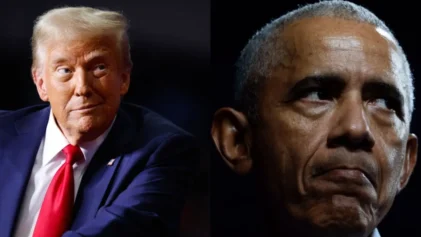Senate Majority Leader Mitch McConnell made his case against the idea of reparations for Black American descendants of slavery on Tuesday, arguing that America’s “original sin” is a thing of the past.
During his weekly press conference, McConnell raised eyebrows when he cited the Civil War, civil rights legislation, and the election of our nation’s first Black president, Barack Obama, as his reasons for why reparations are “not a good idea.”

Senate Majority Leader Mitch McConnell said he opposes the idea of reparations for slavery, and suggested the election of Barack Obama was proof of how far we’ve come as a nation. (ABC video screenshot)
“I don’t think reparations for something that happened 150 years ago for whom none of us currently living are responsible is a good idea,” the GOP lawmaker told reporters.
“We’ve tried to deal with our original sin of slavery by fighting a civil war, by passing landmark civil rights legislation,” he added, saying our nation is “always a work in progress.”
After suggesting the election of an African-American president was enough to atone for the horrors of slavery, McConnell argued how hard it would be to determine exactly who’s eligible for compensation, citing mass immigration.
“We’ve had waves of immigrants as well who’ve come into the country and experienced dramatic discrimination of one kind or another. So no, I don’t think reparations are a good idea,” he concluded.
The Senate majority leader’s remarks come just a day ahead of a scheduled House Judiciary hearing on Juneteenth, the unofficial holiday for many African-Americans marking June 19, 1865, the day enslaved Blacks in Texas learned of the end of slavery, to address the matter. According to NPR, the House Judiciary Subcommittee on the Constitution, Civil Rights and Civil Liberties is calling for a commission to “study and develop reparation proposals for African-Americans,” as well as a formal apology from the United States government.
Acclaimed author Ta-Nehisi Coates, whose 2014 article “The Case for Reparations,” published by The Atlantic, is credited for re-igniting the national conversation around restorative justice for those impacted by the legacy of slavery, is set to testify. Emmy-nominate actor Danny Glover and Sen. Cory Booker (D-N.J.) are also scheduled to appear, along with a host of other civil rights activists and civil rights leaders.
The issue of reparations has gained traction in the months leading up to the 2020 elections and a number of Democratic presidential hopefuls, including Sens. Kamala Harris and Elizabeth Warren, have voiced their support for it to varying degrees.
“We have to be honest that people in this country don’t start from the same place or have access to the same opportunities,” Harris told The New York Times earlier this year. “I am serious about taking an approach that would change policies and structures and make real investments in Black communities.”
Booker (D-NJ), who announced his run for president earlier this year, has since introduced legislation to study reparations, while independent Vermont Sen. Bernie Sanders has previously dismissed the idea, describing reparations as “divisive.”
McConnell’s latest comments on the matter sparked a flurry of reactions from critics who expressed outrage, specifically over his suggestion that America had made up for slavery by electing Obama.
“‘Obama was reparations’ is a take for the ages,” one critic tweeted.
One critic noted that while he doesn’t support the idea of reparations, “the fact that a Senate Majority Leader doesn’t realize that lumping the election of an African-American as president is a quasi-reparational ‘dealing with the original sin of slavery’ is offensive in itself shows how far we have to go.”
Watch more in the video below.
Senate Majority Leader Mitch McConnell says he is against reparations for slavery in part because it would be hard to know whom to pay.
— ABC News (@ABC) June 18, 2019
"No one currently alive was responsible for that." https://t.co/B5XCIp38p7 pic.twitter.com/nPhYeNTIj7


